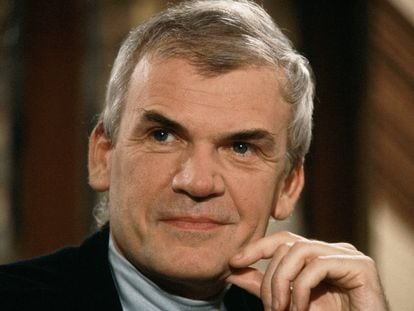Of Picasso's physiognomy and worthy heir of Franz Kafka and Jaroslav Hašek, and contemporary of Ivan Klíma, Imre Kertész or Danilo Kiš, all of them members of an extraordinary generation of Eastern narrators, Kundera is linked to political literature – because he was a communist retaliated in Czechoslovakia after the Prague Spring and was forced into exile – when he confessed on many occasions that he detested the thesis novel, Incompatible for a restless and broad-spectrum writer who read with profit.
Read moreWriter Milan Kundera dies at 94
To the extent that his narrative is imbued with contemporary political thought and philosophy—from Nietzsche to Heidegger—, and that his idea of art cannot be separated for a moment from the human condition and its historical circumstance, there can be no talk of a split between narrative and essay in a work like Kundera's. Hybrid from start to finish.
His exile to France in 1975 boosted his literary creation in the language of Proust, which he mastered with the same brilliance with which Conrad or Nabokov made English the language of their narrative, and Kundera conceived his work from an enriching diglossia that would make him a model example of a transterrado writer who uses the imaginary of the language of the place that welcomes him. His literature, which has been associated with satire, the grotesque humor of his admired Rabelais and sometimes magical realism, is the result of his conviction that ridicule is an existential category born of the fertile union of comedy and humiliation, and Kundera's work is satirical in the same way that he often falls into the temptation of the absurd or surrealism as we could describe it later. read Beckett. His readers know well that eroticism is the main ingredient in his texts, always a grotesque point, stained by a certain critical and vaudevillian spirit that he inherits from Robert Musil and that obeys the emotional sordidness of his condition of transterrado plunged into disappointment.
The Feast of Insignificance (2014)
It was his last novel, a book of jokes, a tiny covert treatise on ethics and disbelief or an immense oxymoron in which death is around for the sordid party and the epicurean embraces the eschatological, the destiny, always dramatic, of the individual.
Exceptional critic of the idea of Europe, accurate analyst of the bowels of literary creation in priceless essays, lay preacher of exile and identity, Kundera, as in a trade of darkness, has been lighting lights that illuminate the paths of intelligence. He was duke in the Kingdom of Redonda of Javier Marías and devoted reader and idolatrist of Don Miguel de Cervantes.
The Book of Laughter and Oblivion (1979)
A sort of narrative polyanthea, it combines narrative, reflections, stories and texts of difficult generic ascription, according to the author's idea that every artist should always try to expand the limits of his art and seek new formal challenges. It is the novel in which he defines the concept of litost, a feeling of commiseration suffered by those who are aware of their misery in relation to the situation of those who form their environment.
The Unbearable Lightness of Being (1984)
His masterpiece, on which falls the dense shadow of his own biography of a man ostracized by a totalitarian regime. Set in Prague in 1968 under Soviet socialism, the novel, strongly philosophical for its existential reflection, analyzes the uncertainties of its protagonist, exhibited as in a theatrical soliloquy before the social scenery that restricts him. Kundera's entire universe is concentrated in the pages of this work, one of the reference novels of contemporary narrative, in which everyday life, love experience and the bitterness inherent in the twentieth century are intertwined.
The Art of the Novel (1986)
An essential title in his bibliography, as well as an essay already classic around the novel —"art born of the laughter of God"— which he rescues from its discredit, which he links forever to knowledge, and in whose bowels he digs with an unusual brilliance. "The work of every novelist contains an implicit vision of the history of the novel, an idea of what the novel is," he writes, convinced that every good novel contains the flurry of novels that have contributed to its gestation: "each work is the answer to the preceding works, each novel contains all the previous experience of the novel." For many, the first chapter, "The discredited legacy of Cervantes", is essential.
The Betrayed Testaments (1992)
One of his ledgers. An essay on the novel written in the manner of a novel, it explores the genre contemplating it in the light of music and its own contemporary history, through which Kafka or Hemingway travel leaving their mark. It deals intelligently with originality ("imitation does not mean lack of authenticity"), with the necessary separation of the creator from his creature and with the devastating effects of confusing the biography of the first with the interpretation of the second, that is, of the death of the author enunciated by Barthes, of the legitimacy of Picasso painting Velázquez's meninas, of the authorship and respect owed to it and of the complexity of its meaning.
The curtain. Essay in seven parts (2005)
A full-fledged tractatus on the seed planted by Cervantes writing Don Quixote, on the scope of Goethe's world literature, on a plausible definition of novelist and on not a few questions of substance that every good reader raises with immense pleasure.

